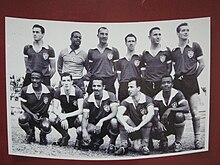Canto do Rio FC
The Canto do Rio Foot-Ball Club - usually just called Canto do Rio for short - is a sports club from Niterói in the Brazilian state of Rio de Janeiro . The club, founded on November 14, 1913, is best known for its activities in the field of football , where it had its heyday from the 1940s to the 1960s, but could not achieve any major titles. These days Canto do Rio is more geared towards popular sports.
After the professionalization of its gaming operations, Canto do Rio played from 1940 to 1964 as the only club of the then federal state of Rio de Janeiro in the first division of the then federal district of Brazil, the capital Rio, which after the transfer of the capital to Brasília in 1960 until the unification the state of Rio 1975 in turn traded as Guanabara . In the first division of the city's national championship , Canto do Rio usually finished at the bottom of the table. The highlight was the sixth place in 1944. In that season, Canto do Rio set the top scorer with Geraldino, who scored 19 goals. Since relegation in 1964, the club played occasionally in the second division, but otherwise mainly third class.
Between 1933 and 1968 Canto do Rio won the city championship of Niterói five times, a competition that was held from 1913 to 1974. In the 1940s, the club also took part in the city tournament of Rio , which was held between 1938 and 1951, and was able to finish there in 1944 with a remarkable third place.
From 1940 to 1945 Ely do Amparo - later part of the legendary Expresso da Vitória by CR Vasco da Gama and the Brazilian national team between 1949 and 1953 - played for Canto do Rio. Danilo Alvim , also part of the Vasco da Gama team and the national team of that era, played there in 1943. With Caetano da Silva "Veludo" , Brazilian national goalkeeper nine times between 1954 and 1956, another well-known player in the ranks of Canto do Rio was in 1956. In the late 1950s, Gérson de Oliveira Nunes , world champion with Brazil in 1970, began his career in the club's youth teams.
In 1941, the Argentinian Abel Picabéa began his coaching career here, who in later years coached many of the larger clubs, albeit without significant success, and in 1958 led Real Oviedo to the Spanish first division.
These days the association is occupying an area of around 12,000 m² in the city, which has numerous sports fields, swimming pools, sports halls, saunas and buildings for events of all kinds for its members.
Web links
- Canto do Rio Foot-Ball Club , Official Website

